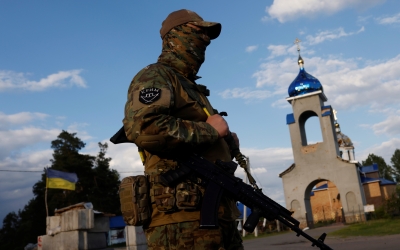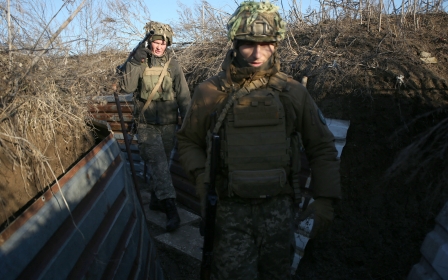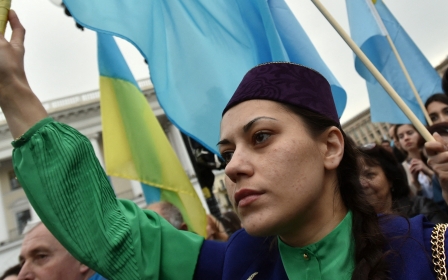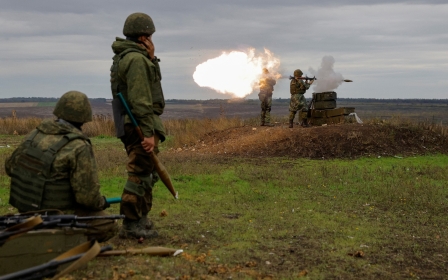Russia-Ukraine war: Money and menace being used to recruit Muslims in the Caucasus
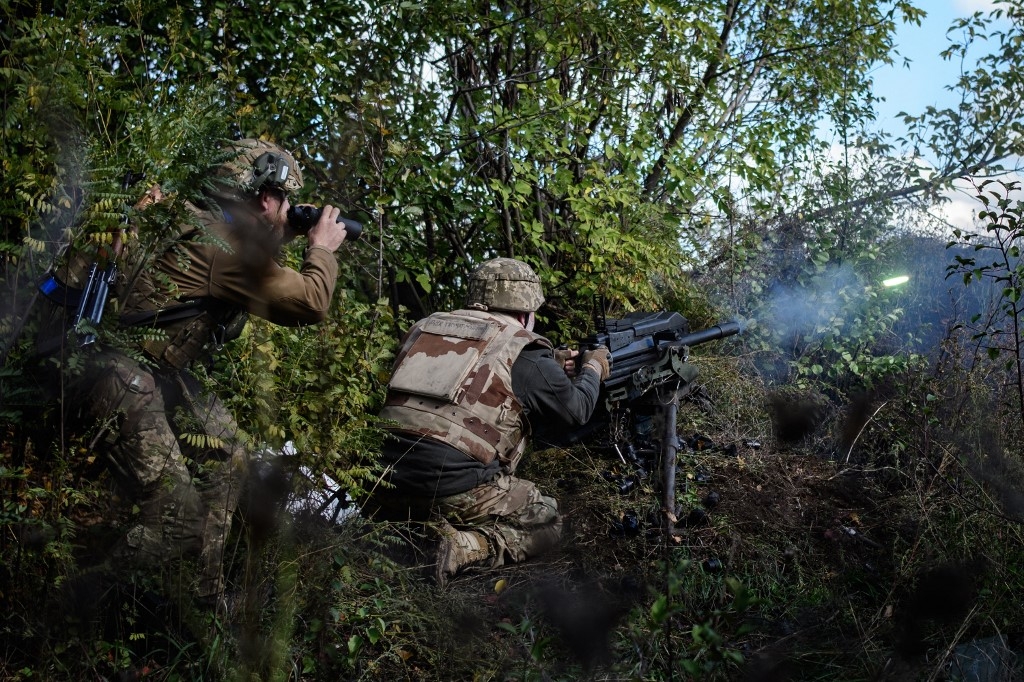
Russian President Vladimir Putin’s partial mobilisation last month to deploy troops to Ukraine has created disarray in its Muslim-majority Caucasus territories and led to violent protests.
But Circassians and other Muslims living in the mountainous region between the Black and the Caspian seas told Middle East Eye that many were willing to serve in exchange for lucrative monthly salaries.
Others said they would sign up in order not to raise the suspicions of the Russian authorities, who could come after them for retribution.
Ahmed, a Circassian miner living in the northern Caucasus, told MEE that he had convinced his son to serve in the army because there were no jobs in their town, other than in a couple of old factories and mines.
“Participating in the war is better than trying to find work in a factory and a mine,” he said. “We cannot refuse. It is a lot of money.”
Ahmed said that if his son survived the war and came back with the money promised by the Russian state, he could afford to set up a business.
The Russian Caucasus is a neglected part of the federation, lacking investments and industry. Residents complain that jobs are mostly found in ethnic Russian-majority parts of Russia, such as the north or east.
The North Caucasian Federal District is the poorest economic zone in Russia, with a monthly minimum wage of around 13,000 rubles ($205). The Russian government is offering 135,000 rubles ($2,131) a month to conscripted soldiers.
Ibrahim, a conscripted Circassian soldier, said his main motivation to fight in Ukraine was the lucrative salary, but he thought that senior and local officials would take a cut of his money before it got to him.
“But even if we get half of this salary, it is enough for us,” he said.
'Everyone is scared of Kadyrov'
Others say the local authorities would retaliate if they refused to serve in the war.
Kambolat, another Circassian from the Kabardian tribe, said he knew the Ukraine invasion wasn't going well and that the conditions were rapidly deteriorating, but felt he had to let his son go so as not to anger local officials.
“The army even couldn’t distribute the uniforms," he said. “I personally bought a lot of stuff for my son.”
Samil, another parent from Dagestan, believed that it should be ethnic Russians fighting against the Ukrainian army rather than his son. But he had to let his son go to the war zone.
“I told my son to turn himself into the Ukrainians whenever possible,” he said. “We told this to every child we sent to the army, so they can survive.”
Thousands of Chechens are believed to have been deployed in Ukraine and played a key role in the capture of the strategic Black Sea town Mariupol earlier this year.
Chechen leader Ramzan Kadyrov, a Putin loyalist who is head of the Chechen Republic, a semiautonomous Caucasus region within the Russian Federation, has been one of the most prominent cheerleaders for the war in Ukraine.
On Saturday, Kadyrov claimed that another 70,000 Chechens were ready to join the 10,000 already fighting in Russia’s military operation in Ukraine.
“Ten thousand Chechen fighters are already participating in this noble cause. If necessary, another 70,000 are ready to join them,” Kadyrov wrote on his channel on the Telegram social network.
Kadyrov earlier said that the mobilisation did not extend to Chechnya. However, last week he posed with soldiers about to be deployed to the front.
Some Chechens interviewed by MEE believed their children were being deployed to Ukraine as part of a suicide mission, since being infantry in a highly sophisticated war where the opposition is using artillery, rockets and drones could be only considered as such.
“Everyone is scared of Kadyrov,” said Muhammed, whose son has been deployed to Ukraine. “We cannot do anything.”
Opportunity
Another Chechen, a former commander, said Kadyrov had been running the country like a corporation.
“He sells our soldiers after producing them for Putin,” Rahman said. “Many Chechen youths are joining Kadyrov’s squads to prove themselves by killing as many Ukrainians as possible and receiving money, status and power in return.”
Rahman had already taken his son and grandson out of the country.
Rahman said many Chechens were looking at the war as an opportunity rather than something they do out of loyalty to Putin or Kadyrov. The former commander claimed that about 1,000 Chechen fighters had already lost their lives in Ukraine.
'There is a terrorist threat against Russia. As people who suffered under Islamic terrorism, we have to heed the call. There will be a new wave if Russia weakens'
- Murad, Dagestan
The Circassian and Chechen communities in the Caucasus also have people who are staunchly pro-Russian and pro-Putin.
Dagestan resident Murad, whose family is close to the Russian administration, believed it was vital he joined the draft.
“There is a terrorist threat against Russia. As people who suffered under Islamic terrorism, we have to heed the call,” he said. “We will have a new wave of terrorist attacks if Russia weakens.”
He also added that the footage showing resistance against mobilisation in the region was the work of Islamic militants.
Similarly, two Chechens claimed they were fighting against "terrorists" in Ukraine and that they were not serving in expectation of money or status.
Despite the new recruitment efforts, the war in Ukraine isn’t going in Russia’s favour. The Ukrainian army, with its sophisticated western weapons, has captured huge swathes of territory in a counteroffensive that started in September, pushing Russian troops out of Kharkiv and moving east across the Oskil River.
“We have to wait and hope that our children will survive,” one Circassian parent said. “Our hands are tied.”
Ragip Soylu contributed to this article.
Middle East Eye propose une couverture et une analyse indépendantes et incomparables du Moyen-Orient, de l’Afrique du Nord et d’autres régions du monde. Pour en savoir plus sur la reprise de ce contenu et les frais qui s’appliquent, veuillez remplir ce formulaire [en anglais]. Pour en savoir plus sur MEE, cliquez ici [en anglais].


